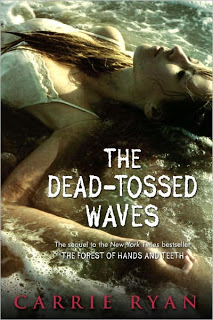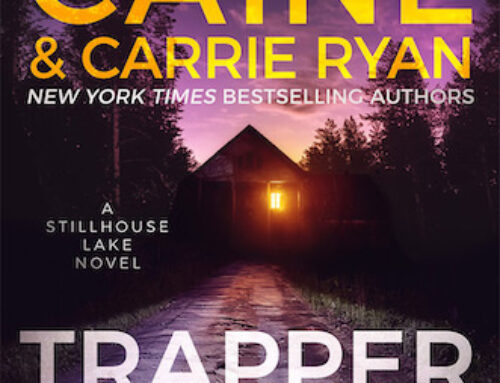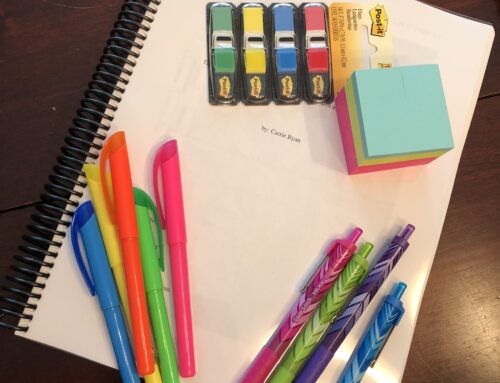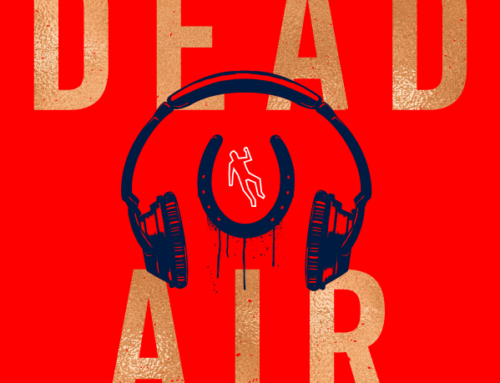When I got to the end of writing The Dead-Tossed Waves I also felt it was pretty obvious who I would dedicate the book to: my mother, Bobby, and my step-father, Doug. This is a post about why.
The dedication reads:
to Roberta Hatch
the light on the horizon that means hometo Douglas Keith Kidd
for loving her, and all of us, so muchand to love at first sight (and Chiquita bananas)
The Forest of Hands and Teeth is about Mary and her quest to determine how she wants to define her life. Yes, there’s a love triangle and I’ve talked before about how I think love triangles work — each boy (in my case) represents a different part of the heroine and she must choose who SHE wants to be before she can choose which partner best compliments that part of her.
In the first book, I think it’s pretty clear that while both Harry and Travis are totally viable options for Mary, she loves Travis. He’s the one who is willing to venture past the gates, to question their life in the village and to dream big. Harry represents a more stable love and companionship. Travis, to me, is a like a bright blazing conflagration while Harry is more of a steady burning ember. They’re both great men (or I hope they come across that way), but Travis is who fits with Mary best in The Forest of Hands and Teeth; he compliments her passion and drive.
 The Dead-Tossed Waves picks up with the story quite a bit after the end of The Forest of Hands and Teeth and from a different point of view: Mary’s daughter, Gabry. At some point in the book, Mary leaves to go back to her village and when we meet her again she’s standing with Harry and I hope it’s pretty clear they’ve rekindled a relationship (or are in the process of doing so). Mary says at one point that she doesn’t need Harry to complete her anymore, just to be with her. And she’s pretty clear that it never would have worked out between them when they were young — both of them had to grow up and have their own separate lives and become their own independent person before they could come back together again.
The Dead-Tossed Waves picks up with the story quite a bit after the end of The Forest of Hands and Teeth and from a different point of view: Mary’s daughter, Gabry. At some point in the book, Mary leaves to go back to her village and when we meet her again she’s standing with Harry and I hope it’s pretty clear they’ve rekindled a relationship (or are in the process of doing so). Mary says at one point that she doesn’t need Harry to complete her anymore, just to be with her. And she’s pretty clear that it never would have worked out between them when they were young — both of them had to grow up and have their own separate lives and become their own independent person before they could come back together again.
But she also acknowledges that they share such a deep past — a deep bond that will always tie them together. They grew up in the same village with the same friends and fears and questions. This shared background created such a lasting foundation between them: they understood everything about each other because of that time.
[The spoiler free bits follow:]
I based this relationship on my mother and step-father who have an amazing love story. Both of them grew up on banana plantations in Latin America. I think my step-father, Doug, knew of my mother (she was one of four girls who caused all kinds of trouble, I think everyone pretty much knew them) but they don’t remember meeting each other officially (though it’s likely there were times when they were on the same banana boats from the plantations up to school in New Orleans).
They both grew up, got married, had kids, lived completely separate lives. And then one year in the summer of 1995 they both attended the Chiquita Banana Reunion in New Orleans (yes, such a thing exists). My mother was a smoker at the time (boo!) and was standing by an ashtray looking for a match when Doug offered her a light. They started to talk. Then they went to the party and started to dance. They stayed up all night dancing. Doug was supposed to leave the next day and cancelled his flight. When he did eventually leave (on my Mom’s birthday) he sent roses to her room. As it turns out, he lived only a few hours from my mom and he came to visit that next weekend (and left her a love note in Spanish not realizing that I, who was the only daughter still living at home, spoke Spanish and found it first – haha!).
 It was truly love at first sight for them. They got married later that year (yes, it was their kids who said “wait a minute, perhaps slow things down a bit?”) and I got a step-father and two older brothers (really, truly, awesome). Mom and Doug spoke Spanish around the house. He called her “Mi Amor,” they danced. They went back to the Chiquita Banana reunions every other year. A large part of their bond was that shared history: they both understood what it was to grow up on those banana plantations. He’d even lived in one of the houses my mom lived in as a kid. They knew the same people, the same banana boats, the same language.
It was truly love at first sight for them. They got married later that year (yes, it was their kids who said “wait a minute, perhaps slow things down a bit?”) and I got a step-father and two older brothers (really, truly, awesome). Mom and Doug spoke Spanish around the house. He called her “Mi Amor,” they danced. They went back to the Chiquita Banana reunions every other year. A large part of their bond was that shared history: they both understood what it was to grow up on those banana plantations. He’d even lived in one of the houses my mom lived in as a kid. They knew the same people, the same banana boats, the same language.
And I honestly believe that it took them growing up, moving into separate paths, having their own lives, and coming back together again later to find such love and compatibility. My mother just wasn’t the same woman when she met Doug as she was when she met my father. If she and Doug had met earlier in life, I’m not sure they could have shared the same kind of love and companionship. What they looked for in a partner changed over their lives and it really did seem like, at least from an outsider perspective, that they didn’t need each other to complete the other one, they needed to just love each other and be companions. Which they were.
Many of you may know that my step-father, Doug, passed away on December 22, 2010. My mother sat by the bed, holding his hand. I stood behind her, watching. Before he was moved into hospice, when he was still upstairs in the ICU, we told one of the nurses how he and my mom met. He smiled and chuckled (wishing he could cut in and tell the story right, I’m sure). Really, that’s the last time I saw him be aware of any of his surroundings.
He was diagnosed with kidney cancer in the summer of 2006 and in the spring of 2009 he ended treatment and we called in hospice. Honestly, I thought I’d never see him get out of bed again. But then we got our miracle two years. He gained strength and weight. He and my mom flew to Costa Rica for a two week bus tour to all their old haunts with their buddies from the Chiquita Banana Reunions. He got to see his son, my brother, coach the winning state soccer champs. His other son got married. I got married, my sisters and brother had kids. He was there for all of it (well, except for JP and I’d elopement, but he was there to congratulate us later). Truly, it was a miracle two years.
So we knew it couldn’t last, though we didn’t know it would happen quite as quickly as it did. But, like so many of that generation, he’d smoked for most of his life and in the end his lungs couldn’t stand up against the COPD.
I knew when I was writing The Dead-Tossed Waves that Doug was terminally ill. And I knew that I’d be dedicating the book to him and my mother because they shared a deep and lasting love and I’d used it as a model for Harry and Mary. I didn’t know when I finished writing The Forest of Hands and Teeth that this would be in Mary’s future but when I looked at the way Mom and Doug held hands, the comfort they shared in talking about their childhoods, I knew that this is what would bring Mary comfort and joy later in her life. She’d had her adventures (and boy did she have adventures) and she had a daughter she’d raised and loved fiercely but who had grown and would be leaving the nest.
 I dedicated the book to my mother because The Dead-Tossed Waves is as much about Mary being a mother as it is about Gabry being a daughter. And of course because it’s from Gabry’s POV she doesn’t necessarily spend that much time thinking about her mom because that’s what we do when we’re young: we go off on our adventures. But Gabry always knew that her mother was there — the light on the horizon that meant home — and would always be there. I’m lucky to live my life the same way, knowing that my mother is always a phone call or a short drive away. That she will accept me unconditionally with open arms.
I dedicated the book to my mother because The Dead-Tossed Waves is as much about Mary being a mother as it is about Gabry being a daughter. And of course because it’s from Gabry’s POV she doesn’t necessarily spend that much time thinking about her mom because that’s what we do when we’re young: we go off on our adventures. But Gabry always knew that her mother was there — the light on the horizon that meant home — and would always be there. I’m lucky to live my life the same way, knowing that my mother is always a phone call or a short drive away. That she will accept me unconditionally with open arms.
I’m very lucky to have had Doug in my life as well. He taught me patience, kindness, unconditional love and acceptance. He was the man that knew everyone — the produce stocker at Publix, the UPS man, he knew their stories and their dreams. He listened and loved. As my sister so perfectly said at his service, “Doug had the ability to make you feel like you were the only person in the room. And you were the BEST at what you did.”
So I thank Chiquita Bananas for bringing them together. Mom and Doug made me believe in love at first sight. I miss him. I’m glad I had the chance to hand him a copy of The Dead-Tossed Waves and thank him for being in my life.
Thanks to mom and Doug for letting me borrow their love for my book and thanks to all of you for letting me share it with you.





What a beautiful story! Thanks for making me cry the good kind of tears!
I just finished The Dead-Tossed Waves last night. This post made me bawl all over again. What a beautiful tribute. Now I know why the book evoked such emotions! So lovely.
What a great story! Thanks for sharing.
I love knowing the stories behind dedications. This one is so lovely.
Thank you for sharing that beautiful story!
What a lovely story. I'm glad you shared this with us! Now hand me a tissue please. 🙂
Thanks for this, Carrie! I just lost my father to kidney cancer a few weeks ago. What a horrible disease 🙁 … Dad never got to see me publish my first book, but I already have the dedication written for when that day comes! This made me realize how therapeutic that will be!
Beautiful, beautiful story. Thanks for sharing it.
Harry and Mary's love in The Dead Tossed Waves felt authentic to me, and now I know why! Thank you for sharing this insight, Carrie. I love your writing and truly look forward to reading The Dark and Hollow Places.
Oh, Carrie, what a beautiful post. Thank you.
Beautiful story. Thank you for sharing. (And now it's my turn to be tearing up.)
Wow, Carrie, thank you for sharing. I am all teary-eyed and had goosebumps while reading about your stepfather. I could tell from your tweets last December that he meant a lot (probably not a strong enough word) to you.
Thank you for sharing.
appreciate revealing. I will be just about all teary-eyed together goosebumps while studying your current stepfather. I could tell out of your tweets previous 12 , which he meant a great deal (not likely a robust ample word) to you personally.buy rs gold
FF14 Gil